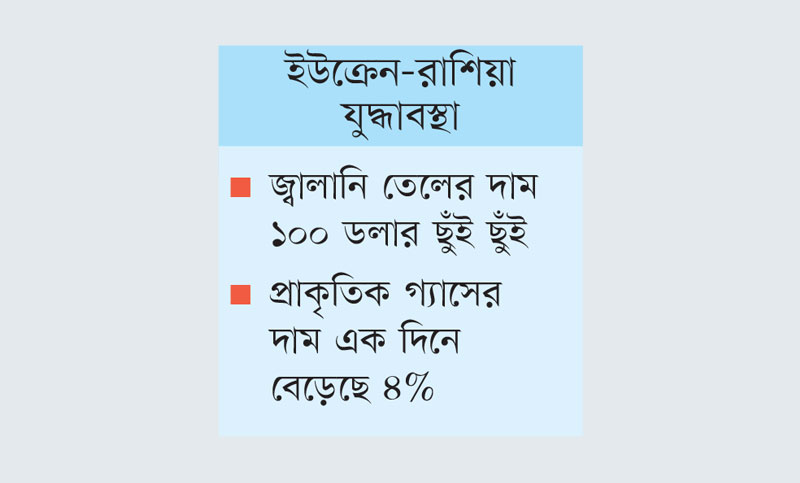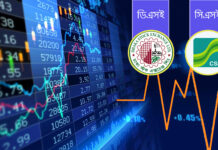While countries recovering from the post-Coronavirus global economy are struggling under the pressure of inflation, the Russia-Ukraine war tension is adding fuel to the fire. Fuel oil and the overall commodity market are becoming unstable. Yesterday, the price of fuel oil rose by 3.5 percent in a single day, reaching close to $100. The prices of essential daily commodities such as wheat, corn, edible oil, gold, silver, and minerals required for industry are also on the rise due to supply concerns.
Global stock markets were also volatile. Major European markets fell in morning trade yesterday, but the market returned to a positive trend after Russia said it was opening diplomatic relations with Ukraine. However, Asian stock markets fell. Hong Kong's Hang Seng Index fell 2.7 percent. The Russian stock market saw the highest decline of more than 8 percent.
In early trading on Tuesday, London's Brent crude oil price rose $3.48, or 3.7 percent, to $98.87 per barrel. At the same time, the price of U.S. WTI crude oil rose $4.41, or 4.8 percent, to $95.48 per barrel. Although Brent oil fell to $98 by the end of the day, it was 2.5 percent higher than the previous day.
"There are concerns that the Russia-Ukraine war could disrupt oil supplies," said Victoria Scholler, head of investment at Inter-Active Investor. "In addition, Western sanctions on Russia will affect both the oil and gas markets. Russia is the world's second-largest oil exporter and the world's top natural gas exporter." Yesterday, the price of natural gas in the US market also rose by 4 percent to $4.60 per million British thermal units (MMBTU). Similarly, natural gas prices in the UK and the European Union markets rose by 7 percent in one day. Europe depends on Russia for about 35 percent of its natural gas.
JP Morgan, one of the world's largest financial institutions, said in a statement that the war could push oil prices to $125 per barrel this year and $150 next year. This will reduce global GDP growth by 0.9 percent in the first half of the year and increase inflation to 7.2 percent.
According to Trading Economics, a commodity market research firm, the prices of precious metals and food products are also rising due to the Russia-Ukraine tensions. In the past week, gold prices have increased by 2.19 percent, silver by 2.89 percent, steel by 1.54 percent, platinum by 5.38 percent, soybeans by 3.98 percent, wheat by 4.17 percent, corn by 3.80 percent, palm oil by 3.20 percent and sugar by 1.60 percent.
"Ukraine is one of the largest exporters of wheat and corn. If the country's exports are disrupted for any reason, the prices of these products in the world will increase significantly," said Ophelia Coutts, an analyst at global risk consultancy Verisk Maplecroft.
An analysis by Reuters news agency says that an attack on Ukraine could disrupt commercial shipping through the Black Sea. The impact would be severe. This could increase the price of all food grains imported and exported through this route. The top four exporters of food grains are Ukraine, Russia, Kazakhstan and Romania. The products of these countries are exported through various ports on the Black Sea.
An attack on Ukraine will also have an impact on the financial sector. European financial institutions may face more problems. According to information provided by JP Morgan, Austria's Raiffeisen Bank International, Hungary's OTP and UniCredit Bank, France's Société Générale Bank, and the Netherlands' ING financial institution have businesses in Russia. A portion of the profits of these banks and financial institutions come from Russia. Western businesses may face a crisis because they are involved with Russia in various ways. The country's largest oil producer, Rosneft, is owned by the UK's multinational energy company BP.
Russia is one of the world's largest producers and exporters of natural metals. As a result, the price of precious metals will increase. In the face of fears of Western sanctions, the prices of nickel and aluminum have increased the most in several years. Russia's main export products include gold, aluminum, cobalt, copper, nickel, palladium, etc.





